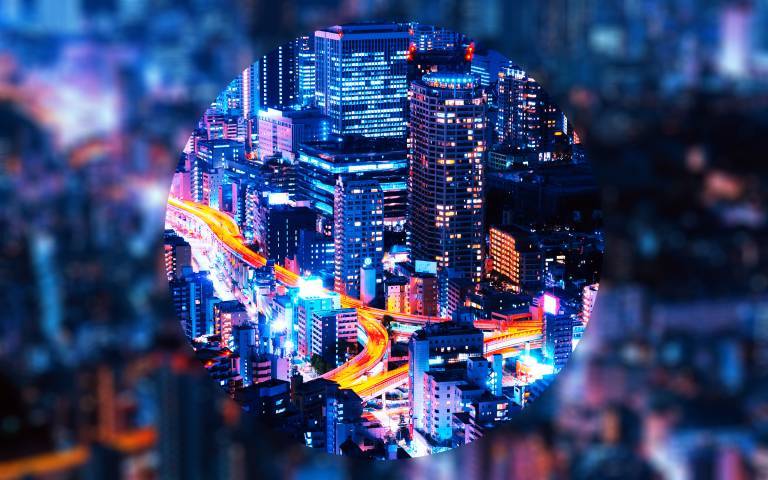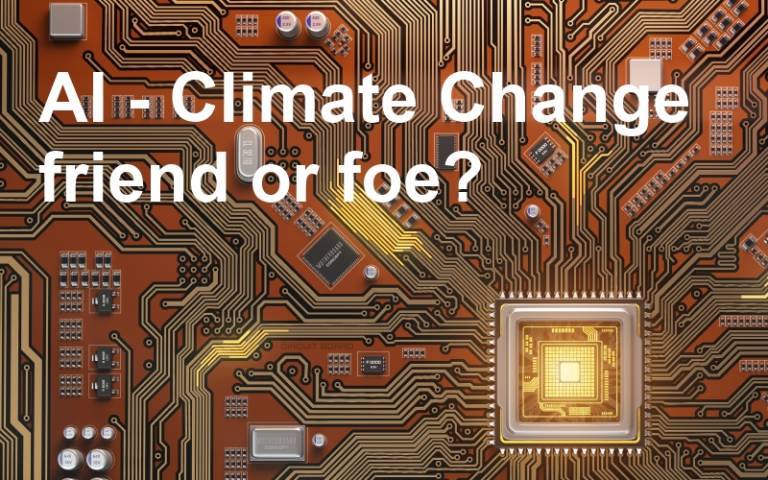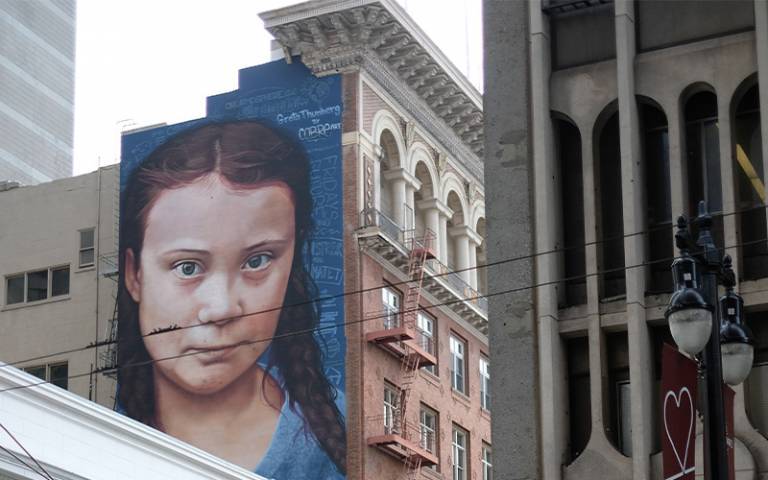We've gathered a collection of podcasts, blogs and videos that explore the role of these important topics in building a greener future, that is fairer for everyone.
What have data, health, economics and engineering got to do with tackling the climate crisis?
As we face the climate crisis, we need to adapt our buildings towns and cities to make them more sustainable, healthier places to live. But in such a complex world, how can we make effective change? Explore this series of articles, videos and podcasts from memebers of the Bartlett School of Environment Energy and Resources on how data, economics, and environmental engineering can help build a more sustainable, healthier future.
If these core skills interest you and you want to make a positive change in the world, UCL's Sustainable Built Environments, Energy and Resources BSc or MEng could be the right undergraduate degree for you.
Explore the themes:
- Student life blogs
- Sustainable buildings, communities and cities
- Data for sustainability
- Health, Wellbeing and the Built Environment
- Climate change and economics
Student life blogs

Pace over perfection in the energy transition: Maria's Experiences from the BIEE Conference
Follow undergraduate student Maria Ahmed as she reflects on how the British Institute of Energy Economic Conference provides valuable insights for her studies and future career.
Sustainable buildings, communities and cities
Did you know that buildings generate nearly 40% of the world’s CO2 emissions each year? In this collection we explore how communities, businesses and policy makers can collaborate to make meaningful changes in cities. We also look at how environmental engineering can help us design buildings that don’t cost the earth.
During the Sustainable Built Environments, Energy and Resources BSc and MEng you will learn about the theories behind sustainable buildings and decision making for change, before putting them into practice in the Sustainable Buildings and Cities Challenges.
 How can we take effective climate action in large and complex cities?
How can we take effective climate action in large and complex cities?

Our researchers explain using a ‘systems approach’ to transform cities to net-zero carbon whilst making them healthier for communities who live there. Both BSc and MEng Sustainable Built Environments, Energy and Resources students will learn about using systems thinking to create sustainable change when faced with complex evolving issues.

Building back greener: How do we achieve a green recovery after Covid-19?
Visiting Professor Raimund Bleichwitz explores what “Building back greener” after the Covid-19 pandemic has given fresh appetite to catapult societies into a future of reclaimed urban spaces, clean technology and net-zero carbon. This article encapsulates our School’s combined expertise and mission to build a better, more sustainable future.
Read 'Building back greener: How do we achieve a green recovery after Covid-19?' ►

Environmental engineering in practice
UCL’s Student Centre is the hub of student life at the university. But did you know it has been designed ground source heat pumps and natural ventilation, a green roof and solar panels?
In the MEng route of Sustainable Built Environments, Energy and Resources you will learn about sustainable and low carbon building technologies as well as how the design of sustainable buildings affects health, wellbeing, comfort and human performance. These Environmental Design and Engineering practices are the heart of our Student Centre.
Read about UCL Student Centre's ‘Outstanding’ sustainability rating ►
SoundCloud Widget Placeholderhttps://soundcloud.com/uclsound/building-better-how-should-we-heat-our-h...
How should we heat our homes?
Back to explore ▲
Data for sustainability
We now have unprecedented access to data. Through analysis and artificial intelligence, we can harness this data to tackle sustainability issues, reduce our energy consumption and make our buildings more efficient.
Data analytics is one of the fundamental skills you will learn on the Sustainable Built Environments, Energy and Resources BSc and MEng. After learning the mathematic and statistical foundations you will go on to learn about machine learning, data analysis and analytics for sustainability.
 Smart energy, smart buildings, smart health
Smart energy, smart buildings, smart health

People consume large amounts of energy indoors, however most of our buildings are inefficient. Our researchers explore how big data can be used to reduce our building’s CO2 emissions and make them more efficient.
 Artificial intelligence – climate change friend or foe?
Artificial intelligence – climate change friend or foe?

Researchers from across UCL explore the use of artificial intelligence in rising to the challenges of the climate crisis, and share small changes you can make today to reduce your technology carbon footprint. Dr Aidan O’Sullivan from the Bartlett School of Environment, Energy and Resources explains how he is using machine learning to analyse how changes in manufacturing processes can reduce energy consumption.
YouTube Widget Placeholderhttps://www.youtube.com/watch?v=eaoQnItF55M&t=73s
Using big data to asssess the potential of renewable energy in Switzerland [French, English Subtitles]
This video explores the role of Big Data in quantifying the maximum amount of energy that can be extracted from geothermal heat pumps deployed on a large scale in Switzerland. Dr Nahid Mohajeri Pour Rayeni from the Sustainable Built Environment, Energy and Resources BSc and MEng team was also a part of the HyEnergy project team.
Read and watch 'Assessing the potential of renewable energy in Switzerland using Big Data' ►
Health, wellbeing and the built environment
The built environment we live in also impacts our health and wellbeing. It is important that where we work, live and study are healthy and support our physical and mental wellbeing. This video and podcast explore the impacts of the built environment on health and wellbeing and how we can use environmental design and engineering to improve it.
In the Sustainable Built Environments, Energy and Resources BSc and MEng you will tackle Health, Wellbeing and Climate change in the Sustainable Cities Challenge in your second year. Those who go on to study the MEng will go on to explore Health, Comfort and Wellbeing in Sustainable Buildings in their fourth year.
Wellbeing and care in the built environment
How do we design cities to support human health and wellbeing? What would a healthy house look like? Or a school, an office block, or even a whole neighbourhood? Watch the animation to find out more about how our research is making an impact in the real world: from helping to improve indoor air quality in schools to solving overheating in new and existing homes.
SoundCloud Widget Placeholderhttps://soundcloud.com/uclsound/climate-change-and-health-exploring-co-b...
Climate change and health
Environmental changes and social inequalities effect our cities and the people within them. In this podcast our researchers Dr Harry Kennard and Dr Gesche Huebner explore the relationship between climate change and mental health.
Listen to the episode on Soundcloud
Climate change, economics and policy
Delivering sustainable societies will require unprecedented levels of investment across all elements of the built environment. Effective decision-making and policy, drawing on a range of economic theories and concepts, is essential to make this investment happen.
In your first year, you will learn about a range of theories and concepts across economics and policy for sustainability. You will then go on to apply and further develop this knowledge through their application to real-world problems.

From an economist’s perspective, Greta Thunberg is right.
In this blog our former Master’s student Johannes Schroeten explores climate change from an economic perspective, reflecting on Greta Thunberg’s experiences of people not taking action when faced with the threat of global catastrophe.
SoundCloud Widget Placeholderhttps://soundcloud.com/uclsound/must-cutting-co2-cost-more-for-those-wit...
Must cutting CO2 cost more for those with less?
Why is economics key to tackling climate change? Climate Economist and Comedian Dr Matt Winning explores the role of economy in transitioning to net zero in this UCL Generation One Podcast.
Listen on Acast | Spotify | Apple Podcast
 Close
Close

